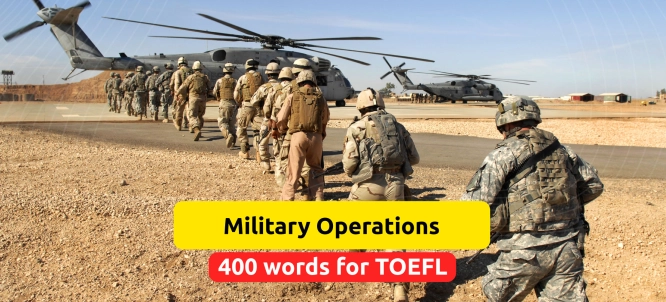by PushtoLearn
Military Operations
Table of Contents
Military Operations Flashcards - Vocabulary Practice for TOEFL
These exercises focus on Military Operations Vocabulary
List of Military Operations Words for the TOEFL
|
Word |
Definition |
Example |
|
Allegiance |
Loyalty or commitment to a group, cause, or country. |
The soldiers swore their allegiance to the nation. |
|
Artillery |
Large-caliber weapons used in warfare, such as cannons or missiles. |
The artillery provided crucial support during the battle. |
|
Battle |
A fight or conflict between armed forces. |
The decisive battle changed the course of the war. |
|
Cease |
To bring to an end or stop something. |
Both sides agreed to cease hostilities temporarily. |
|
Hierarchy |
A system of ranks or levels within an organization. |
The military hierarchy determines the chain of command. |
|
To Be in the Trenches |
To be involved in the most challenging or active part of a task. |
The new recruits quickly found themselves in the trenches during the campaign. |
|
Mobilize |
To prepare or organize troops or resources for action. |
The country began to mobilize its army after the declaration of war. |
|
Rank |
A position within a hierarchy, especially in the military. |
She was promoted to the rank of captain after the successful mission. |
|
Ratio |
A proportional relationship between two numbers or quantities. |
The ratio of officers to soldiers is higher in elite units. |
|
Strategic |
Carefully planned to achieve a specific goal, often in war or business. |
The troops took control of the strategic bridge to cut off supply lines. |

Usage in TOEFL Exam Formats
Reading Section
-
Words like hierarchy, artillery, and strategic often appear in passages discussing war history, military strategy, or leadership structures.
-
Example Question: What does the passage imply about the role of artillery in modern warfare?
Listening Section
-
Terms such as mobilize, rank, and allegiance may be used in lectures or discussions on political science or historical conflicts.
-
Example: “The army was mobilized quickly to respond to the threat.”
Writing Section
-
Use advanced words like cease, ratio, and hierarchy to enhance essays about governance, strategy, or leadership.
-
Example Sentence: “A well-defined hierarchy ensures that commands are effectively communicated during military operations.”
Speaking Section
-
Employ terms like to be in the trenches, battle, or strategic to articulate ideas during speaking tasks.
-
Example: “Being in the trenches during a project teaches valuable lessons about teamwork and perseverance.”
Common Mistakes
-
Misusing "Allegiance" for General Loyalty:
-
Mistake: "She showed her allegiance by attending the meeting."
-
Correction: "She showed her support, but allegiance is a term better suited for strong, formal loyalty, often in political or military contexts."
-
Confusing "Artillery" with Small Arms:
-
Mistake: "The soldiers used artillery like rifles during the attack."
-
Correction: "Artillery refers to large-caliber weapons, not personal firearms like rifles."
-
Using "Rank" Without Context of Hierarchy:
-
Mistake: "She ranked well in the exam."
-
Correction: "In a military context, rank refers to a position in the hierarchy, not performance."
-
Overgeneralizing "Strategic":
-
Mistake: "The strategic plan for the party included choosing a venue."
-
Correction: "In military terms, strategic refers to plans designed to achieve significant goals, such as gaining a tactical advantage in war."
-
Misapplying "To Be in the Trenches" Literally:
-
Mistake: "He was literally in trenches working on the garden."
-
Correction: "To be in the trenches is a metaphor for being involved in the most challenging aspects of a task."
FAQ
What does "allegiance" mean in a military context?
"Allegiance" refers to loyalty or commitment to a country, cause, or leader, often emphasized in military oaths.
How is "artillery" used differently from "weapons"?
"Artillery" specifically refers to large-caliber weapons like cannons and missiles, while "weapons" is a broader term that includes small arms.
What’s the significance of "hierarchy" in military discussions?
"Hierarchy" describes the structured chain of command in military organizations, ensuring clarity in decision-making and order.
How can I use "strategic" effectively in TOEFL essays?
Use "strategic" to describe carefully planned actions aimed at achieving long-term goals, e.g., “Strategic alliances during wartime often determine the outcome of conflicts.”
What does "to be in the trenches" mean in non-military contexts?
It metaphorically describes being deeply involved in the most challenging aspects of a task or situation, such as intense work or problem-solving.

